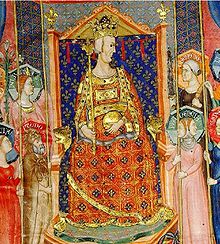King Robert of Naples
| Robert | |
|---|---|

King Robert from the Bible of Naples
|
|
| King of Naples | |
| Reign | 5 May 1309-20 January 1343 |
| Predecessor | Charles II |
| Successor | Joanna I |
| Born | 1275 |
| Died | 20 January 1343 (aged c. 68) Kingdom of Naples |
| Spouse |
Yolanda of Aragon Sancha of Majorca |
| Issue More |
Charles, Duke of Calabria Charles d'Artois |
| House | House of Anjou-Naples |
| Father | Charles II of Naples |
| Mother | Maria of Hungary |
Robert of Anjou (Italian: Roberto d'Angiò), known as Robert the Wise (Italian: Roberto il Saggio; 1275 – 20 January 1343), was King of Naples, titular King of Jerusalem and Count of Provence and Forcalquier from 1309 to 1343, the central figure of Italian politics of his time. He was the third son of King Charles II of Naples and Maria of Hungary, and during his father's lifetime he was styled Duke of Calabria (1296–1309).
Robert was born around 1275, the third from of the future Charles II of Naples (then hair apparent) and his wife Mary. His father was the son of the King of Naples, Charles of Anjou, who had established an Italian realm nine years earlier in 1266. During the Sicilian Vespers in 1282 against his grandfather Charles, the little child Robert, aged only seven, was the hostage of Peter III of Aragon, his grandfather enemy. Three years later, his grandfather would die at the age of 59 at Foggia in Italy, when Robert was still a little child at ten years old, leading to his father (then a hostage) becoming King of Naples as Charles II, with little Roberts adolescent brother, Charles Martel of Anjou as heir apparent. Charles Martel would have a son three years later, the future Charles I of Hungary, when Robert was 13 years old.
After the death of his elder brother, Charles Martel of Anjou in 1292, Robert, by now an adult, became heir to the crown of Naples (though his little nephew could just as rightfully be King Charles IIs heir); to obtain the crown of neighbouring Sicily, he married King James of Sicily's sister Yolanda, in exchange for James's renouncing of Sicily. However, the Sicilian barons refused him and elected James' brother, Frederick II. The war continued, and with the Peace of Caltabellotta (1302) Robert and the Angevin dynasty lost Sicily forever, their rule limited to the south of peninsular Italy.
...
Wikipedia
